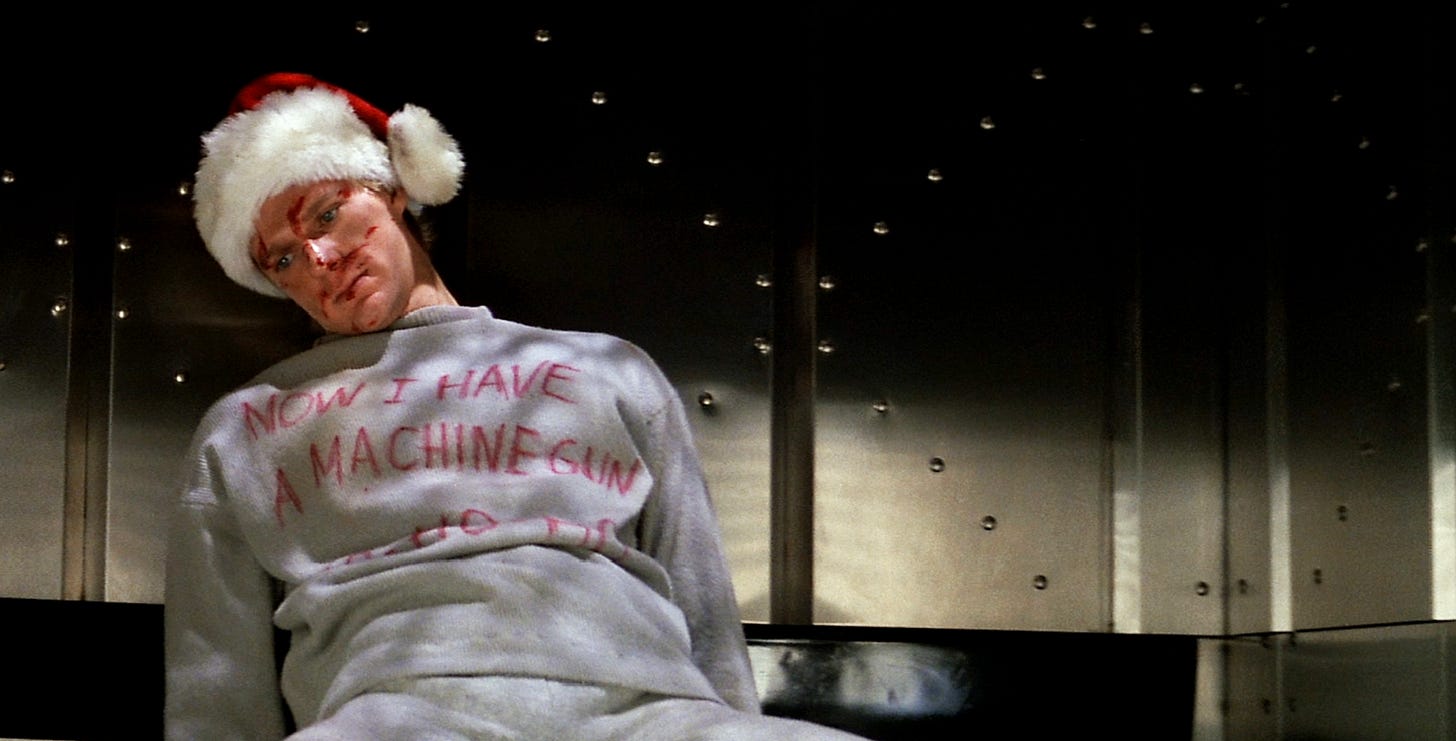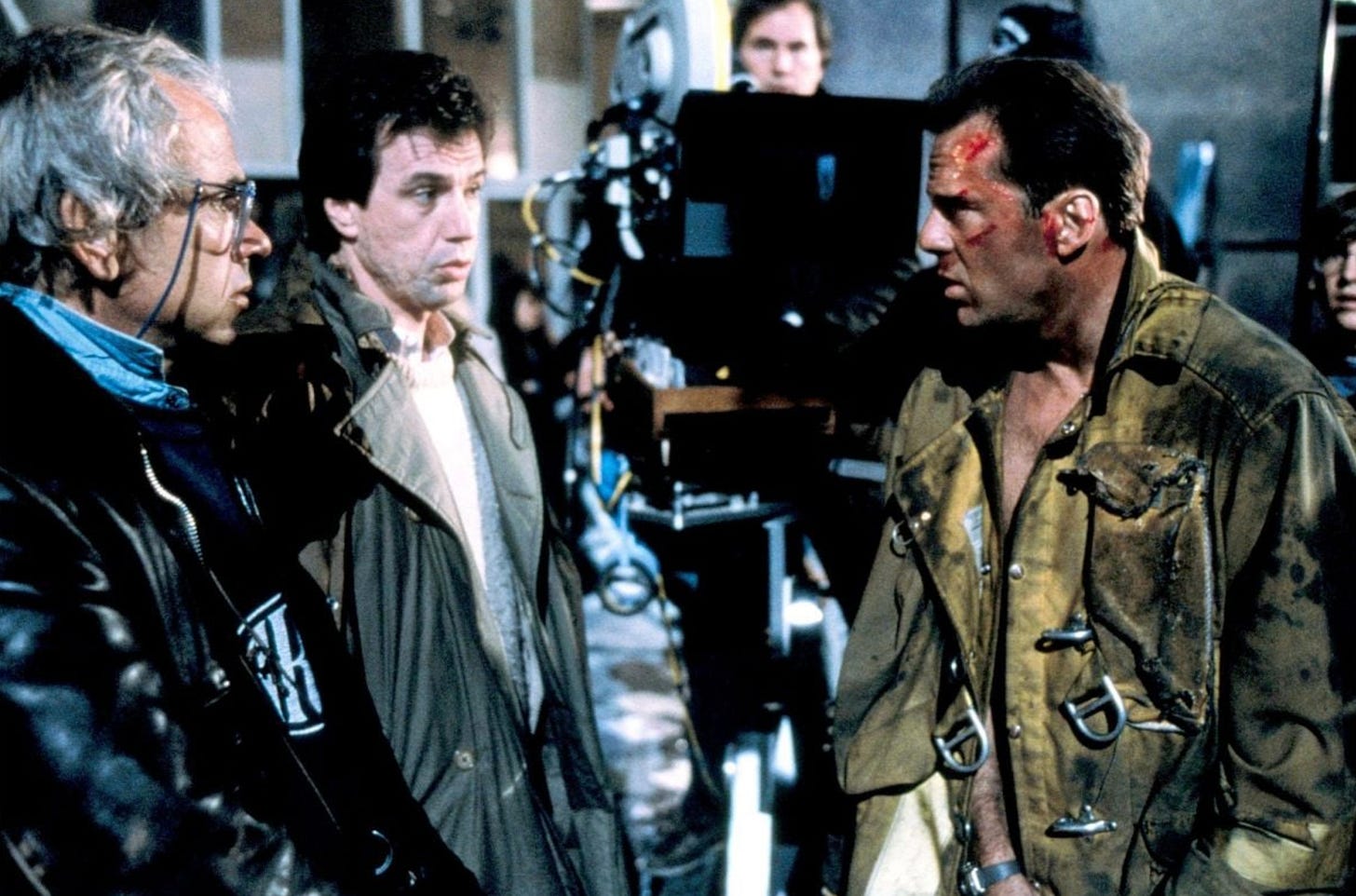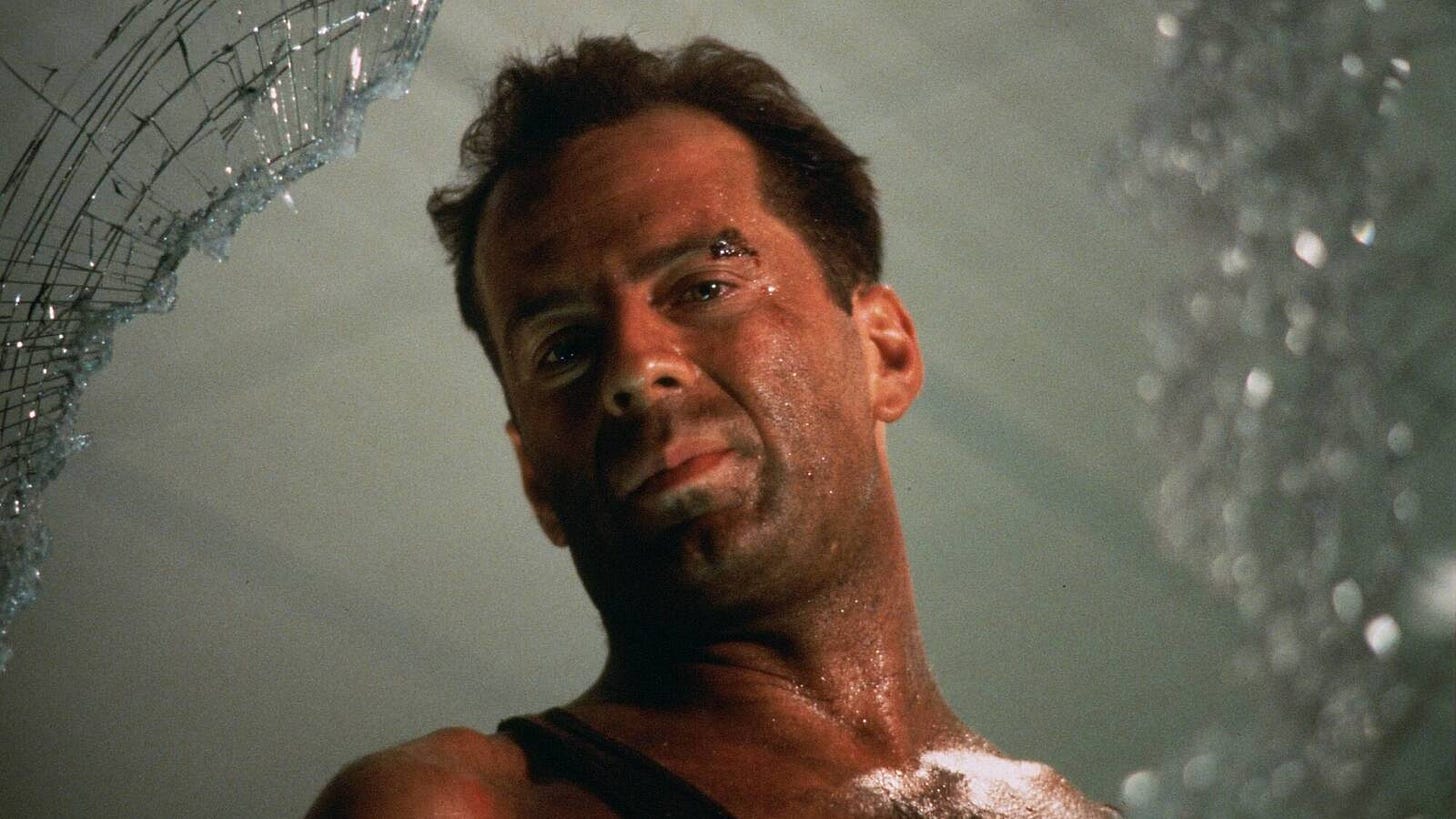Ah, it’s Christmastime, isn’t it? Time for trees, decorations, lights, online shopping, holiday music playing at every store, Bath and Body Works carrying every Christmas-themed candle possible, peppermint tossed into every dessert and Starbucks drink imaginable, ugly sweaters that have now become obnoxious sweaters, Egg Nog (I guess), your annual poinsettia turning green because you left it by the window, figuring out who has the kids and at what times after the divorce, and, finally, the age-old tradition of watching a handful of “Christmas movies” over and over again until they’re packed away or ignored for the other eleven months of the year.
The topic of which films fit the Christmas rotation is always a controversial one, as everyone has their favorites and everyone is prepared to die on a hill for which one is the best and which one is or isn’t a bonafide “Christmas movie”.
Enter the most controversial of them all: Die Hard.
Directed by John McTiernan (Predator, The Hunt For Red October, The 13th Warrior), Die Hard stars Bruce Willis as hardened New York City Police Detective John McClane, estranged from his wife and kids, who now reside in Los Angeles circa 1988. In an attempt to mend their relationship, McClane flies to LA to spend the holidays with his family, arriving on Christmas Eve day and escorted via limo to Nakatomi Tower, a giant skyscraper where his wife, Holly (played by Bonnie Bedelia) is a top-level executive working for a Japanese company, which is having its annual holiday party on the 30th floor.
Everything goes to hell when a group of thieves disguised as terrorists arrive with the full intent of breaking into the company vault, stealing their bearer bonds, and setting up an elaborate bait-and-switch plan that would see the roof of the building blown up as they escape into a non-extradition country. The only problem is John McClane, who finds himself in a cat-and-mouse game with the thieves (led brilliantly by Alan Rickman in his first-ever film role as mastermind Hans Gruber) that erupts in some beautifully executed action, suspense, character, and humor moments that have led many (myself included) to call Die Hard the greatest action film ever made.
Note: Greatest ACTION film ever made, not the greatest CHRISTMAS movie ever made.
Does Die Hard have Christmas elements in the film? Of course. It takes place during that season. It would be weird for there to be no elements at all. There are people saying “Merry Christmas” or “It’s Christmas” from time to time. There are decorations. There are thematic elements worked into Michael Kamen’s score. McClane kills a terrorist and puts a Santa hat on his head and writes, “Now I have a machine gun. Ho-Ho-Ho” on his shirt. The film ends with the 1946 version of the song “Let it snow! Let it snow! Let it snow!” by Vaughn Monroe. These elements have convinced more than a few people to believe that Die Hard is a Christmas movie by definition and creation.
It isn’t.
Based on the 1979 original novel “Nothing Lasts Forever” by Roderick Thorp, a sequel to his 1966 best-selling novel “The Detective” (made into a film starring Frank Sinatra), Die Hard was adapted by screenwriters Jeb Stuart and Steven E. de Souza. Many details from the novel changed, while still pulling much of the framework into the film, including the setting being on Christmas Eve in an LA highrise with the hero being shoeless, crawling through HVAC tunnels, jumping off an exploding roof with a firehose tied around his waist, and dropping a bundle of C4 plastic explosives down an elevator shaft. The rest was shaped up by the screenwriters and McTiernan, to craft an action thriller with an untested leading man in Willis, that would be ready for release during the holiday season.
Just kidding. Die Hard was released in theaters on July 20th, 1988, five months shy of Christmastime. I was there. I saw it 14 times in theaters. I was a little obsessed. It was, by studio standards, a summer tentpole release, making a successful haul of $143 million worldwide ($381 million adjusted for inflation in 2024), spawning four more sequels starring Willis, one of which saw McTiernan back as director (1995’s Die Hard With A Vengeance). The only sequel to take place during Christmas was 1990’s Die Hard 2: Die Harder, which is also NOT a Christmas movie, but rather an action movie that takes place during Christmas.
Bruh, why you so worried about it? Who cares if some people say it’s a Christmas movie and some say it isn’t? Well, I care, mostly because there are so many that defend it AS a Christmas movie, when it categorically, thematically, and from inception, was NOT intended to be nor marketed as a Christmas movie. So, why do so many ardently fight for it to be?
To answer that, we must ask: What IS a Christmas movie? Christmas, by its holiday definition, is the annual tradition that celebrates the birth of Jesus Christ (The word itself is derived from “Christ” and “Mass”). It is, as they say, the “reason for the season.” We give gifts at Christmas to loved ones as a way of recreating the three wise men gifting Jesus with gold, frankincense, and myrrh upon his birth in Bethlehem. However, there are plenty of non-religious themes that go with Christmas, including Santa Claus, reindeer, Christmas trees, holiday lights and decor on and in homes, reds, greens, and a partridge in a pear tree. Covered in lights, of course.
Christmas is also liked to themes and traditions of love, selflessness, and family, all of which revolve around getting together during the Christmas season (and on the actual day) to celebrate, feast, exchange gifts, and generally make merry within those traditions.
From 1938’s adaptation of Charles Dicken’s classic “A Christmas Carol” starring Reginald Owen all the way up to 2003’s Elf starring Will Ferrell, we have a smattering of movies that revolve around Christmas and are, by intent and creation, made to be the definition of a “Christmas movie.” One of the most telling signs that a movie is a Christmas movie is the word itself: Christmas. A Christmas Story, Christmas Vacation, Christmas With The Cranks, White Christmas, How The Grinch Stole Christmas, The Nightmare Before Christmas (which I will concede doubles as a Halloween film), A Bad Mom’s Christmas, Arthur Christmas, Surviving Christmas, Office Christmas Party, Four Christmases…you get the idea.
Does that mean every Christmas movie has to have the word Christmas in it? No, of course not, but having it there is the surest sign of what genre it belongs in. Other films that are absolutely Christmas films, again by design, concept, theme, and narrative include Scrooged, The Polar Express, Love, Actually, Home Alone, It’s A Wonderful Life, Miracle on 34th Street, The Holiday, Jingle All The Way, The Family Man, Prancer, Santa Claus: The Movie, and a cavalcade of others. From obscure comedies to Hallmark nonsense, there is no end to Christmas movies that live up to the genre and then some.
Which brings us back to movies like Die Hard. Or Lethal Weapon. Or The Long Kiss Goodnight. Okay, anything written by Shane Black, who admittedly just loves Christmas and can’t help but insert it into the majority of his work (and a reminder that now is a good time to revisit Kiss, Kiss, Bang, Bang).
These movies, particularly Die Hard, were not made to be Christmas movies. They were not written to have a theme, motif, or design that exemplified or defined them as a holiday movie. In these films, the most important thing that differentiates them is that Christmas is not the reason for the film, but simply the setting that the film happens to take place. For Die Hard, as in the original novel that inspired it, the Christmas Eve party was merely a plot device to get the hero into a high-rise building with a family member. It was not designed to be a celebration of the season with all the usual accouterments that follow it. It was simply a time of the year that the film was set to get the story in motion and maybe add a little flourish. And that’s it.
Die Hard, at its core, is a film about redemption. McClane seeks redemption with his estranged wife. Al Powell, a flatfoot cop played by Reginald VelJohnson, is seeking redemption after having accidentally shot a kid years before while on duty. And, at the end of the day, Die Hard is about good overcoming evil in the face of redemption. It’s not about the Christmas spirit. It’s not about getting a gift you want really bad. It’s not about singing loudly to power Santa’s sleigh. It’s not about the holiday spirit bringing cops and criminals together to let bygones be bygones.
Does Die Hard have overlapping themes? Sure. Love, forgiveness, and redemption could also be seen as Christmas-like themes, but that’s a broad stroke to paint with. Those are human themes, not holiday themes, they just happen to be more prevalent during Christmas, which is frequently seen as the time of the year when you make your last-ditch effort to do something good before the next year rolls around.
And, yes, I will concede that you can draw your own parallels and make Die Hard’s themes into the Christmas movie category if you want to. By the same rationale, I could make Home Alone an action thriller. Or Titanic a dark comedy. We can, by the very nature of our freedom, think and feel whatever we want, and call any movie whatever the hell we want, Christmas or otherwise. But, what you can’t do is argue with the very factual nature of its creation and whether or not it was made for or intended to be a Christmas movie and Die Hard was not.
In an interview with AFI, director John McTiernan, in a very wordy and confusing way, attempts to make the case that Die Hard has “become” a Christmas movie, but was never made to be one. “We hadn’t intended it to be a Christmas movie,” said McTiernan, “but the joy that came from it is what turned it into a Christmas movie.”
So, you may say that the title of AFI’s video or McTiernan’s lengthy explanation is the final word on the subject, but it’s not. For one, McTiernan explicitly says that Die Hard was NOT intended to be a Christmas movie, thereby it isn’t one by concept and definition. For two, AFI’s video title is manufactured to get you to click, not to give you a full breakdown of McTiernan’s explanation.
In 2022, while on the Empire Podcast, McTiernan doubled down on the fact that Die Hard was not made as a Christmas film, saying, “It wasn’t intended as a Christmas movie, or the fact that it was deliberately built around Christmas, but not intended to be a Christmas movie.”
If a movie, or any work of art, is made to be a certain thing, with a certain intent, theme, or vision, and executed in that good faith, then it will be very clear what it is (and what it isn’t). With that said, I also believe that when an artist, such as McTiernan, makes a work, once said work is released to the public, that work can take on many meanings and interpretations. That’s kind of the point of art. It isn’t meant to be one thing for all people. In that, I cannot say that Die Hard isn’t a Christmas Movie to YOU, but I can say for a fact that Die Hard was NOT made to be a Christmas movie, and by definition, classification, and intention isn’t one.
McTiernan elaborates on this same theme via the Empire podcast, saying: "It’s not for us to say [whether it's a Christmas film], it’s people. It’s for the audience to say. If the audience decides they want to make it a Christmas movie, it’s a Christmas movie. It turns out that way."
Die Hard was meant to be an anti-establishment action movie about an everyday guy fighting against insurmountable odds to redeem himself and save his wife. If that brings out the Christmas spirit in you, so be it, but it doesn’t make Die Hard a Christmas movie any more than it makes Home Alone a horror movie (although I would entertain arguments to the contrary on that one).
So, as you file through your rotation of Christmas movies and get your fill until next year, posting on social media that Die Hard is and always will be a Christmas movie, remember that your opinion isn’t a fact and the fact will always remain that Die Hard was never made to be a Christmas movie, even if you believe it is now.
The one thing we can most certainly agree on, however, is that Die Hard is one of the best films ever made and, in my opinion, still the best action film of the genre. On that, there will be no disagreement from me.
Merry Christmas and Yippie-Ki-Yay.












Not a Christmas movie, but still my favorite movie for the last 36 years.